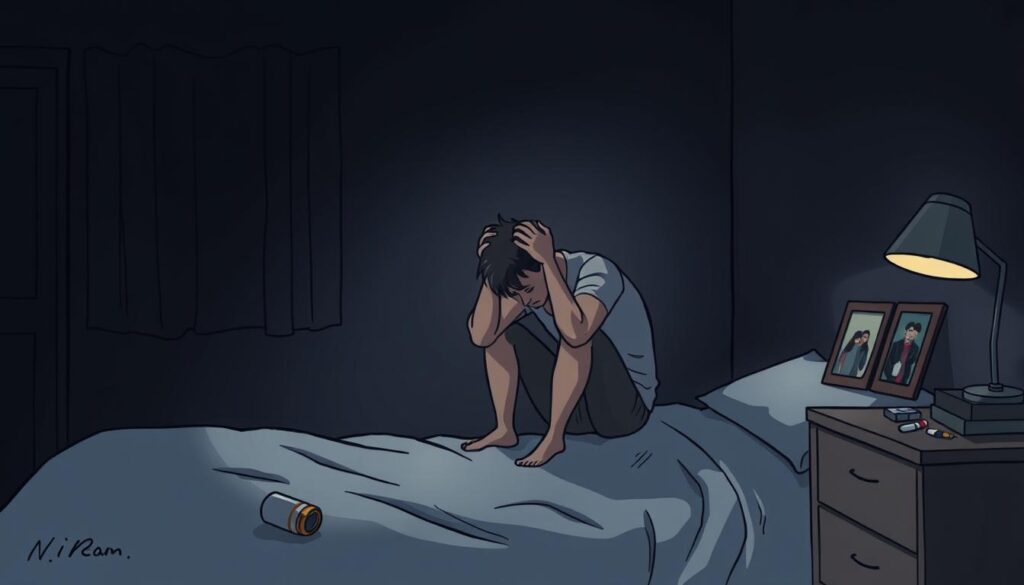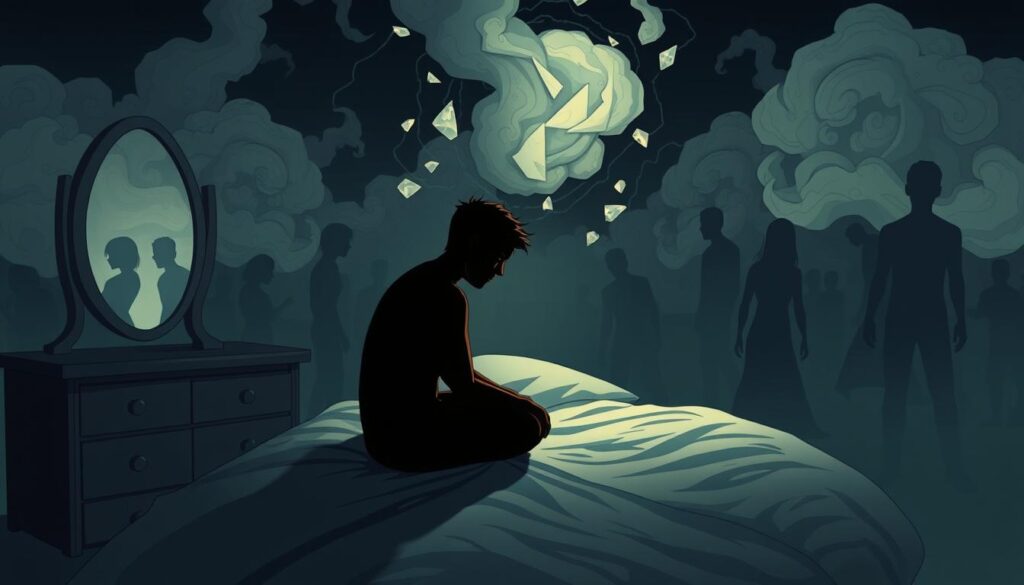Erectile dysfunction (ED) affects more than just a man’s body. It can deeply impact his mental health and emotional state. While most ED cases have a physical cause, the emotional and psychological effects are just as important. Men with ED often face mental and emotional challenges that can hurt their personal and social lives.
The common psychological effects of ED include stress, anxiety, guilt, depression, low self-esteem, and feeling indifferent. These feelings can make ED worse, creating a cycle that’s hard to break. If left untreated, these issues can lead to even more problems, like lower self-confidence, strained relationships, and a lower quality of life.
Here is a solution to improve your emotional health related to ED >>>
It’s key to tackle the mental and emotional sides of ED for effective treatment. Understanding how ED affects a man’s mental and emotional health helps in creating a better treatment plan. This approach can improve outcomes and enhance the well-being of those dealing with ED.
Introduction to Erectile Dysfunction
What is Erectile Dysfunction?
Erectile dysfunction (ED) is when a man can’t get or keep an erection long enough for sex. It’s more common in men over 40 and is growing worldwide. Here is a proven way to help >>>
Prevalence of ED and its Impact
ED can come from many causes, like health problems or mental issues. The Massachusetts Male Aging Study found 52 percent of men aged 40-70 had ED in the late 1980s. By 2025, it’s expected that 322 million men worldwide will have ED.
Finding the cause of ED is key to treating it. Diabetes affects 10.9 million U.S. adult men with ED, with 35 to 50 percent being unable to have sex. ED can hurt both the person and their partner, affecting their lives deeply.

Knowing the risks is the first step to fight ED. Age, health, lifestyle, and mental health all play a part. Understanding ED’s complexity helps improve life for those dealing with it.
Psychological Causes of Erectile Dysfunction
Physical issues aren’t the only cause of erectile dysfunction (ED). Psychological factors like stress, anxiety, depression, low self-esteem, and relationship problems also play a big role. These can make it hard for a man to get and keep an erection.
Stress and Anxiety
Stress from work, money, or relationship issues can mess with a man’s sexual response. Anxiety, especially fear of not performing well (performance anxiety), is a big psychological cause of ED. This worry can make it tough for a man to get and stay aroused.
Depression and Low Self-Esteem
Depression can cause ED by affecting both the body and mind. Low self-esteem, often from past ED or other issues, can also hurt a man’s confidence and sexual self-image.
Relationship Issues and Guilt
Problems in relationships, like conflicts or guilt about not being sexually satisfying, can make ED worse. These issues add to the stress and anxiety a man feels, creating a cycle that keeps ED going.
Working on the psychological causes of ED through therapy, counseling, and managing stress is key. It can help restore sexual function and overall well-being.

Emotional Toll of Erectile Dysfunction
Erectile dysfunction (ED) can deeply affect men emotionally. The anxiety and fear of sexual failure can make things worse. Men with ED often feel less confident and less worthy, hurting their relationships and overall happiness.
Research finds that up to 80% of men over 60 face ED. Men who are more anxious and less outgoing are more likely to have ED. Stress and depression can also make ED worse, adding to the emotional burden.
The psychological effects of ED are significant. More than 95% of men can be treated for ED, says the CDC. Yet, the emotional impact of erectile dysfunction is often ignored. More research is needed to understand ED’s effects on different people, including nonbinary and transgender individuals.
The loss of self-confidence and self-worth due to ED is very hard to deal with. In a study, 75% of men with ED felt sexually unsatisfied, as did 82% of their partners. Also, 69% of men saw ED as a problem, and 74% of their partners did too. This can make relationships harder and lead to social problems.
It’s important to tackle the emotional impact of erectile dysfunction for men’s well-being. Psychological treatments like therapy have shown mixed results. This shows we need a better way to handle ED.
Erectile Dysfunction and Mental Health
Erectile dysfunction (ED) can deeply affect a man’s mental health. It often leads to relationship problems and difficulties in getting along with others. The inability to have sex can make a man feel inadequate, ashamed, and frustrated. This can strain his relationship with his partner.
The emotional and psychological effects of ED can block communication and intimacy. This makes the problem worse.
Relationship Strain and Interpersonal Difficulties
Research shows that ED affects up to 37% of men with anxiety disorders. This includes men with PTSD, OCD, social anxiety, and panic disorder. The severity of ED can range from mild to moderate.
This creates a cycle where ED stress and anxiety worsen the condition. It leads to more relationship and interpersonal problems.
ED can also harm a man’s self-confidence and self-worth. His partner may feel unattractive, rejected, and unloved. It’s important to tackle the mental health side of ED to improve well-being and relationships.
To solve ED’s mental health effects, a comprehensive approach is needed. This includes open communication, lifestyle changes, medication, and psychological treatments. By addressing the emotional and psychological aspects, men with ED can feel better and strengthen their relationships.
Coping Strategies for the Mental Effects of Erectile Dysfunction
Erectile dysfunction (ED) can deeply affect a man’s mental and emotional health. It can lead to anxiety, fear of sexual failure, and lower self-confidence. But, there are ways to deal with these issues.
One good method is counseling and sex therapy. These help men face their emotional challenges and find healthy ways to cope. They also improve communication with their partners. It’s important to address any mental health problems, like anxiety or depression, too.
Stress management is another key strategy. Techniques like mindfulness, meditation, and relaxation can help reduce anxiety and stress related to ED. By managing stress, men can handle the emotional side of ED better.
| Coping Strategy | Description |
|---|---|
| Counseling and Sex Therapy | Helps men work through emotional challenges, develop coping mechanisms, and improve communication with partners. |
| Stress Management | Techniques like mindfulness, meditation, and relaxation exercises can alleviate anxiety and performance-related stress. |
| Addressing Underlying Mental Health Issues | Treating conditions like anxiety and depression can be crucial in managing the mental effects of ED. |
By focusing on both physical and mental health, men can better handle ED. The right support and strategies can help overcome the mental and emotional challenges of erectile dysfunction.
The Link Between Erectile Dysfunction and Cardiovascular Health
Erectile dysfunction (ED) is more than just a bedroom issue. It can signal serious heart problems. Studies show a strong connection between ED and heart disease. This is because the arteries in the penis and the heart often face similar blockages.
ED can be an early sign of heart disease. This is because the arteries in the penis can get blocked before the heart’s arteries do. This makes ED a crucial warning sign.
ED as an Early Warning Sign of Heart Disease
Men with ED face a higher risk of heart problems. This includes heart attacks and strokes. Research shows ED can signal these risks up to three years before they happen.
Managing Cardiovascular Risk Factors
Since ED is linked to heart health, it’s key to check for heart risks. Conditions like diabetes, high blood pressure, and high cholesterol need to be managed. Lifestyle changes can help a lot.
These include more exercise, a healthy weight, quitting smoking, and drinking less alcohol. For men with both ED and heart disease, talking to a doctor is a must. They can find safe treatments.
By understanding the connection between erectile dysfunction and cardiovascular health, men can act early. They can manage ED as an early warning sign of heart disease and reduce cardiovascular risk factors. This is key to staying healthy.
Conclusion
Erectile dysfunction (ED) is a complex issue that affects men deeply. It can cause stress, anxiety, and low self-esteem. If left untreated, it can lead to more mental health problems.
Most ED cases have a physical cause, but the emotional impact is big. A holistic approach is needed to tackle both physical and mental sides of ED. This includes using coping strategies and therapy. It’s also important to remember that ED can be a sign of heart disease.
Men can manage ED by understanding its causes and taking action. This includes medical treatment, making lifestyle changes, and getting psychological support. With the right approach, men can overcome ED and enjoy a fulfilling intimate life.










